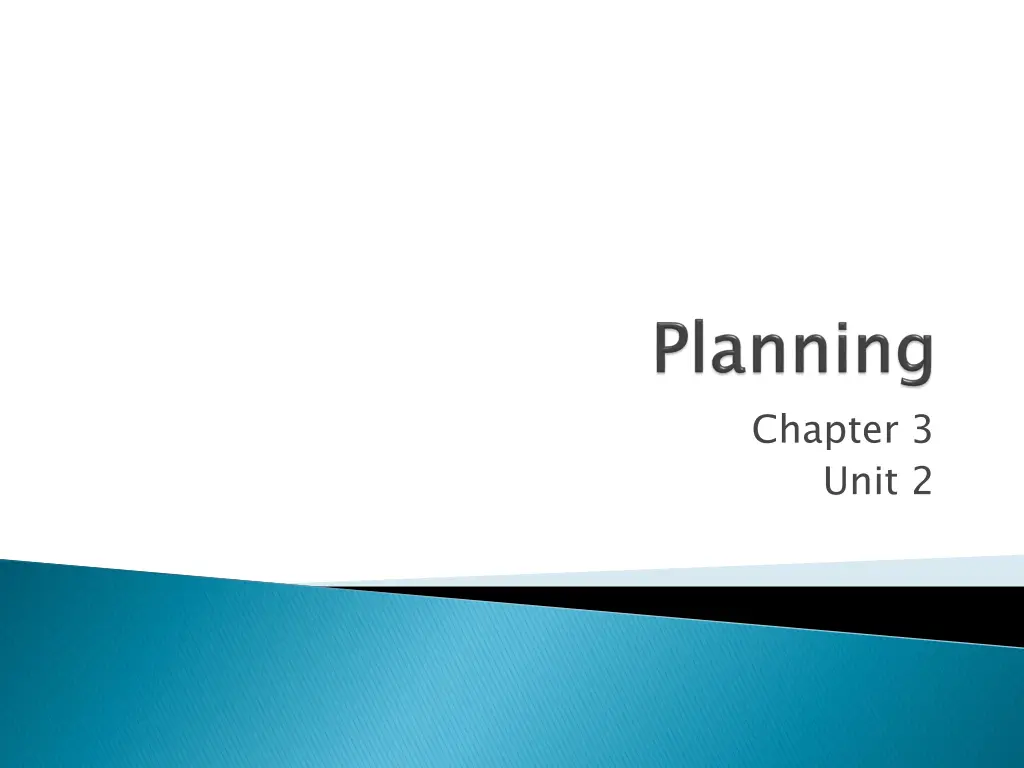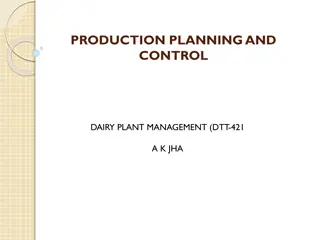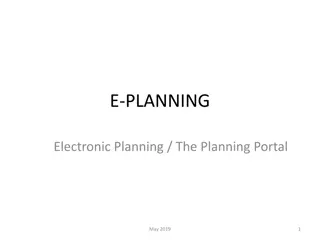
Understanding the Importance of Planning in Business
Planning plays a vital role in business by setting goals, establishing a course of action, and guiding decision-making. It helps minimize uncertainty, improve efficiency, and encourage innovation. While it has many benefits, it also comes with challenges such as being time-consuming and costly. Effective planning involves collecting data, setting objectives, studying alternative plans, choosing the best option, and implementing and following up on the plan.
Download Presentation

Please find below an Image/Link to download the presentation.
The content on the website is provided AS IS for your information and personal use only. It may not be sold, licensed, or shared on other websites without obtaining consent from the author. If you encounter any issues during the download, it is possible that the publisher has removed the file from their server.
You are allowed to download the files provided on this website for personal or commercial use, subject to the condition that they are used lawfully. All files are the property of their respective owners.
The content on the website is provided AS IS for your information and personal use only. It may not be sold, licensed, or shared on other websites without obtaining consent from the author.
E N D
Presentation Transcript
Chapter 3 Unit 2
Planning is deciding in advance what to do, how to do it, when to do it and who is to do it. Planning is the process of establishing goals and a suitable course of action for achieving those goals. It provides the bridge to take us from where we are to where we want to go. It is a mental predisposition to do things in an orderly way, to think before acting and to act in the light of facts rather than guesses.
Goal oriented Future oriented Continuous Pervasiveness Intellectual process Primacy of Planning Helps in Co Involves decision making Efficiency, Economy and Accuracy Goal oriented Future oriented Continuous Pervasiveness Intellectual process Primacy of Planning Helps in Co- -ordination Involves decision making Efficiency, Economy and Accuracy ordination
Minimizes risks of uncertainty Facilitates coordination Facilitates proper direction Establishes standard for control Improves efficiency Encourages innovation Facilitates decision making Reduces wastage of resources
Time consuming Involves paper work Expensive Generates Rigidity Dangers of over targeting and under targeting Danger of Human error Problems with technical and creative staff Problems of changing situations
Collect Develop Planning Premises Determine objectives information and forecast List Study alternative plans alternative ways of reaching objectives Choose best alternative Develop derivative plans Communicate and Implement Follow up
Objectives: provide purpose of the enterprise end point of planning act as guide to overall planning process Strategy Complete plan for accomplishing organizational goals Framing long term objectives Policies General guide to thinking and action rather than a specific course of action Procedure Steps to carry out routine activities
Method Prescribed manner in which a task is to be performed Deals with task comprising one step of a procedure Rule Statements informing what should be done what not under a given situation No flexibility or discretion allowed Programme Concrete scheme of action designed to accomplish given tasks Includes steps to be taken, resources to be used, time limits for each step and assignment of tasks Detailed statements about a project outlining objectives, policies, procedures, rules, resources required and budget to implement any course of action Budget Plan quantifying future facts and figures Represents the total income and expenses
Long term planning On the basis of Time Period Medium term planning Short term planning Types of Planning Corporate planning On the basis of scope Divisional planning Departmental or Unit planning
By Peter Drucker Each and every employee of the organization working whole heartedly towards the attainment of objectives of the organization Objectives of the organization must be set by both management and subordinates jointly Aims at coordinating individual goals with organizational roles
Goal specificity Participative decision making Explicit time period Performance feedback
Optimum utilization of human resources Better communication Fixed responsibility Increased employee morale and motivation Career development of the employees Effective planning and control
Insufficient support from top management Insufficient integration with other systems Improper follow up Time consuming Reward punishment approach-stress Difficult to coordinate management and employees objectives
Thank You Thank You






















